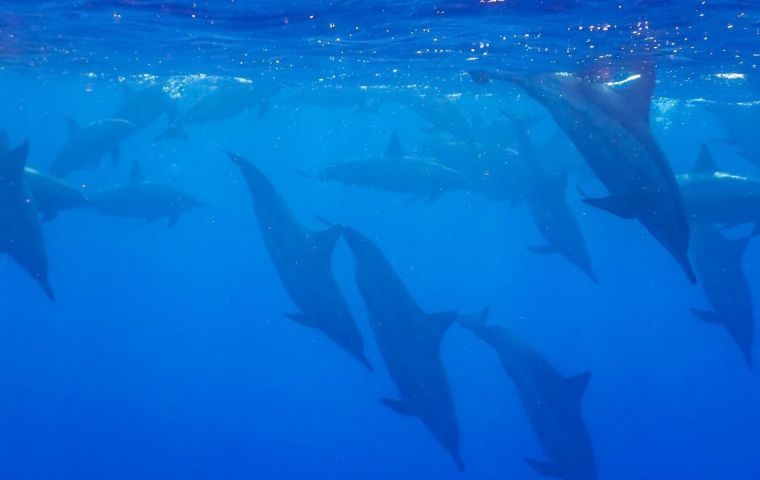MercoPress. South Atlantic News Agency
“Anthropogenic noise impairs cooperation in bottlenose dolphins”, University of Bristal study
 The scientists equipped two trained and highly motivated bottlenose dolphins at the Dolphin Research Center in Florida, USA, with suction-cup attached tags
The scientists equipped two trained and highly motivated bottlenose dolphins at the Dolphin Research Center in Florida, USA, with suction-cup attached tags Dolphins working collaboratively are less successful in the presence of sound generated by humans, a University of Bristol-led team of researchers have shown. The findings, published in Current Biology, imply that dolphins cannot minimize the impact of human-made noise, even by adjusting their own vocal behavior.
Along with international colleagues, the scientists equipped two trained and highly motivated bottlenose dolphins at the Dolphin Research Center in Florida, USA, with suction-cup attached tags, allowing them to record the dolphins’ vocalizations while the dolphins participated in a cooperative task. During the task, the dolphins had to work together to both press their own under-water button within one second of each other, while exposed to increasingly louder levels of noise.
The dolphins produced louder and longer whistles to compensate for the increasing noise levels but were still less successful as the noise got louder.
Lead author Pernille Sørensen from Bristol’s School oif Biological Sciences said: “For years we have known that animals can attempt to compensate for increased noise in their environment by adjusting their vocal behavior. Our work shows that these adjustments are not necessarily sufficient to overcome the negative impacts of noise on communication between animals working together.”
Bristol’s Dr. Stephen King, senior author, added: “It also shows us that dolphins can flexibly modify their vocalizations in an attempt to continue cooperating with their partner, revealing that this species is capable of actively coordinated collaboration.”
Cooperation is common in animal societies and many species use sound that may help coordinate cooperative actions, but using sound also makes them susceptible to disturbance from human-made noise pollution.
“Working with our colleagues at the Dolphin Research Center in Florida, we had a unique opportunity to study the negative effects of noise on cooperative behavior in a controlled setting, something that is almost impossible to do in the wild. Our findings clearly highlight the need to account for how noise affects group tasks in wild animals,” Sørensen noted.
Dr King explained: “We show that human-made noise directly affects the success of animals working together. If noise makes groups of wild animals less efficient at performing cooperative actions, such as cooperative foraging, then this could have important negative consequences for individual health, and ultimately population health.”
This study was funded by The Branco Weiss Fellowship – Society in Science and a postgraduate grant from Bristol’s School of Biological Sciences. The paper, “Anthropogenic noise impairs cooperation in bottlenose dolphins”, involved Pernille M. Sørensen, Abigail Haddock, Emily Guarino, Kelly Jaakkola, Christina McMullen, Frants H. Jensen, Peter L. Tyack and Stephanie L. King and was published in Current Biology.




Top Comments
Disclaimer & comment rulesCommenting for this story is now closed.
If you have a Facebook account, become a fan and comment on our Facebook Page!